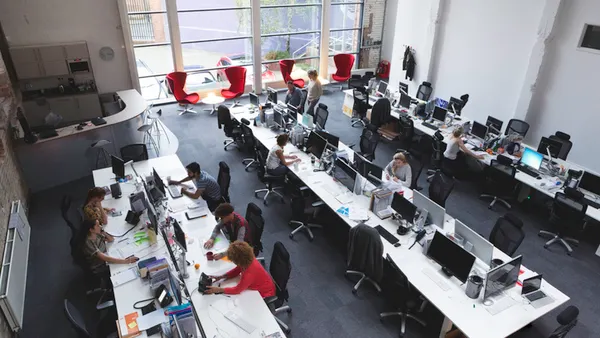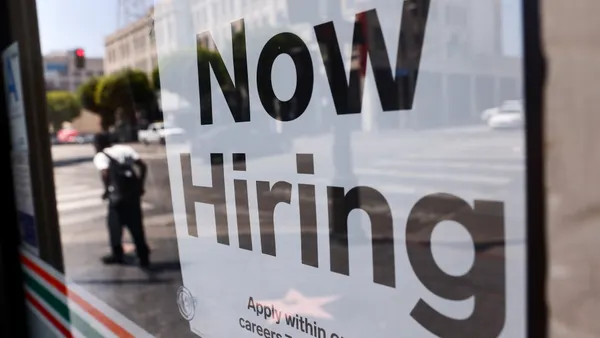Dive Brief:
- Of the different generations in the workplace, mid-career professionals — those aged 25-54 — face the highest potential exposure to change driven by generative artificial intelligence, while younger workers (16 to 24-year-olds) are potentially the most insulated because of the fields they work in, according to an Indeed Hiring Lab report.
- In particular, roughly 1 in 8 mid-career professionals work in management — a field in which generative AI can perform 68% of required skills in a “good” or “excellent” manner, a sign the profession is highly likely to be affected by the tech, the Oct. 26 report found. By contrast, less than 6% of employed younger people work in fields with the highest exposure. Instead, the most common job for workers in this age group are in food preparation and service, which require skills generative AI has rated itself “fair” or “poor” at performing.
- By race and ethnicity, workers of Asian/Pacific Island descent face the highest level of exposure: More than 1 in 5 are employed in highly exposed fields, such as mathematics and computers, where generative AI is “good” or “excellent” at performing almost all of the sector’s inherent skills, according to the report.
Dive Insight:
Aspects of every job posted on Indeed, including HR jobs, have skills that can be done or augmented by generative AI, the hiring platform reported in September. In this follow-up report, Indeed clarified that, “who a worker is — their age, gender and/or race — is not nearly as big an indicator in determining the level or their potential exposure to GenAI as what that worker does.”
However, “understanding who is currently most exposed to GenAI is important for policymakers and employers as they make decisions on the use of the technology going forward,” the report said. For example, as workers age and the types of jobs for which they are qualified change, so does their potential exposure to generative AI, Indeed pointed out.
Gen Z job seekers, the newest members of the workforce, are eager for training and the chance to practice skills they’ve just acquired, a 2022 LinkedIn report found. This can be incentive for providing Gen Z with more opportunities to develop and enhance their generative AI skills as they move through their careers.
Employers seeking to develop a training program may want to take a cue from Walmart and Microsoft, both of which have recently launched initiatives for their workforces.
In August, Walmart announced a generative AI program for some 50,000 employees via desktop and mobile interfaces, CIO Dive reported. The program will speed up processes such as drafting, summarizing large documents and problem solving and is intended to boost productivity, creativity and innovation by freeing employees from monotonous, repetitive tasks, according to the announcement.
Microsoft announced the launch of an AI learning initiative in June aimed at helping workers get ahead of the digital skills gap and alleviate digital debt. The initiative also includes new coursework developed with LinkedIn on core concepts and ethical considerations relating to generative AI, according to the announcement.
AI can empower workers, but employers need to ensure everyone has the skills to use it, a Microsoft exec said in the announcement.












